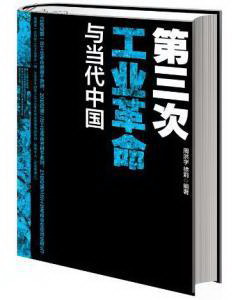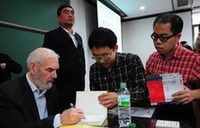China can lead third industrial revolution: Professor
By Sun Ye ( chinadaily.com.cn ) Updated: 2014-03-18 14:59:38
 |
|
The Third Industrial Revolution and China (book cover) Provided to China Daily |
A book of essays released on Monday addresses how China may fare in an age of new fuels, new materials and unprecedented high technology and Internet use, — termed the “third industrial revolution” by the innovation editor at The Economist, Paul Markillie.
 |
Zhou Hongyu, an educator and professor at the Huazhong University of Science and Technology, gave a positive response in the compilation, Third Industrial Revolution and the Reform of Education, part of a textbook series on China and the third industrial revolution published by Hubei Education Press.
“China will definitely be going strong in the direction that the third industrial revolution points to,” Zhou, the volume’s chief editor, told China Daily after the book launch on Monday. “We have the resources, the determination, as well as the skilled people it needs most.” Zhou, who conducted extensive research and interviews about the country’s status in the third industrial revolution, said China is already one of the world’s best developers in such areas as 3D printing, bio-pharmacy and intelligent manufacturing.
Moreover, the country, while undergoing education reform, may have the best chance to shape future creative minds, Zhou said. “The recent PISA (Program for International Student Assessment) result ranked Chinese students at the top of the list,” Zhou said, referring to the testing program of the Organization for Economic Cooperation and Development.
“However much one wants to credit that to rote studying, it’s not. Chinese students do have the best chances in basic education thanks to organizational efforts by teachers.” “We’re reforming the education system to shape talented workers and creators, which the third industrial revolution needs most,” Zhou said.
“We’re in a new age that the past education structure around the world no longer fits,” said Xu Li, a co-author and a professor at Hebei Normal University. “While China missed its chance during the first and second industrial revolutions, it is taking this one.”
|
|
|
|
|
|
|
|






















 Raymond Zhou:
Raymond Zhou: Pauline D Loh:
Pauline D Loh: Hot Pot
Hot Pot Eco China
Eco China China Dream
China Dream China Face
China Face





